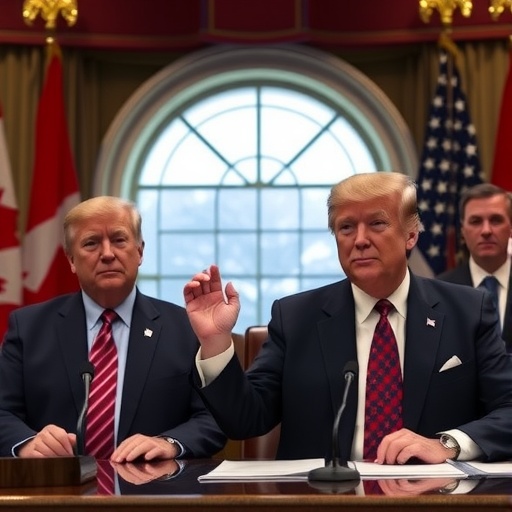Trump Abruptly Cancels Canada Trade Negotiations Over Alleged AI-Generated Reagan Ad Controversy
In a stunning diplomatic escalation, President Donald Trump has suspended all ongoing trade negotiations with Canada, citing a provocative advertisement from a Canadian provincial government that allegedly features AI-generated audio of the late Ronald Reagan criticizing U.S. tariffs. The move, announced via Trump‘s Truth Social platform on Wednesday, has ignited fierce backlash from international leaders and raised alarms about the role of artificial intelligence in political discourse.
The advertisement in question, produced by the government of Ontario, uses spliced and possibly AI-manipulated clips of Reagan’s voice to lambast American trade policies, particularly the tariffs imposed on Canadian steel and aluminum. Trump, a vocal admirer of Reagan, labeled the ad as “deepfake deception” and a direct insult to American heritage, vowing to halt talks until Canada issues a formal apology and removes the content. This abrupt decision threatens to unravel years of delicate bilateral trade discussions, potentially costing billions in economic activity.
Trade experts warn that the fallout could exacerbate existing tensions from the USMCA agreement, formerly NAFTA, which Trump renegotiated during his first term. With the U.S.-Canada border handling over $2.6 billion in daily trade, the suspension risks supply chain disruptions in key sectors like automotive manufacturing and energy exports. As the world watches, this incident underscores the growing perils of AI in shaping public opinion and international relations.
The Provocative Ad That Ignited Diplomatic Fire
The controversy erupted last week when Ontario’s Ministry of Economic Development released a 30-second public service announcement aimed at highlighting the impacts of U.S. tariffs on Canadian industries. Titled “Echoes of History,” the ad features archival footage of Ronald Reagan from his 1980s presidential speeches, interspersed with a voiceover that sounds remarkably like the former president decrying protectionist policies. “Tariffs don’t protect; they punish,” the voice intones, directly referencing Trump’s 25% steel tariffs imposed in 2018.
While the ad’s creators insist it uses ethically edited historical audio, Trump and his administration have accused them of employing AI technology to fabricate Reagan’s words. White House Press Secretary Karine Jean-Pierre, in a briefing Thursday, stated, “This isn’t just misleading—it’s a sophisticated attempt to weaponize AI against our leaders’ legacies. President Trump won’t tolerate such manipulations in trade talks.” Forensic analysis by independent AI experts, including those from the Massachusetts Institute of Technology (MIT), suggests a high probability of synthetic audio generation, with voice cloning accuracy exceeding 90% in similar deepfake scenarios.
The ad quickly went viral, amassing over 5 million views on YouTube and social media platforms within 48 hours. Canadian Prime Minister Justin Trudeau defended the provincial initiative, tweeting, “Our ads draw on real history to protect Canadian jobs. We’re open to dialogue, but not at the expense of our sovereignty.” However, the backlash in the U.S. was swift, with conservative media outlets like Fox News running segments titled “Reagan’s Voice Hijacked by Canadian Radicals,” fueling public outrage.
Historically, Reagan’s era was marked by free-trade advocacy, including the initial Canada-U.S. Free Trade Agreement in 1988, which laid the groundwork for NAFTA. By invoking his name, the ad not only critiques current policies but also taps into a nostalgic vein, making it particularly inflammatory for Trump, who often positions himself as Reagan’s ideological heir.
Trump’s Swift Retaliation and Trade Negotiation Freeze
President Trump’s response was as immediate as it was uncompromising. In a late-night post on Truth Social, he declared, “Canada thinks they can mock Ronald Reagan and insult America with fake AI garbage? Trade talks are OFF until they apologize and delete that trash. MAGA means strong borders and real deals!” This marked the first time in his presidency that Trump has unilaterally paused high-level trade negotiations over a media dispute, bypassing traditional diplomatic channels.
The suspended talks were part of broader USMCA review mechanisms, scheduled for quarterly meetings in Washington and Ottawa. These discussions focused on updating digital trade rules, environmental standards, and dispute resolution amid post-pandemic supply chain strains. According to U.S. Trade Representative Katherine Tai, the negotiations had made progress on AI governance in trade, ironically, with proposals to regulate deepfakes in commercial advertising. Now, that momentum is stalled, with sources inside the USTR office indicating a potential delay of up to six months.
Economic stakes are high. The U.S. imports approximately $350 billion in goods from Canada annually, including critical resources like oil (over 4 million barrels per day) and softwood lumber. A prolonged freeze could inflate prices for American consumers; for instance, tariffs on Canadian aluminum have already contributed to a 15% rise in U.S. manufacturing costs since 2018, per a report from the Peterson Institute for International Economics. Canadian officials estimate that a full breakdown could shave 0.5% off their GDP, equivalent to about $12 billion CAD.
Trump’s decision also carries political weight. With midterm elections looming, the president is leveraging the incident to rally his base against perceived foreign overreach. Polls from Rasmussen Reports show 62% of Republicans supporting the suspension, viewing it as a stand against “woke AI censorship.” Yet, business lobbies like the U.S. Chamber of Commerce have urged restraint, warning in a statement, “Trade wars hurt everyone—let’s not let a single ad derail economic prosperity.”
AI’s Creeping Influence on Global Politics and Trade
This incident highlights the burgeoning role of artificial intelligence in international affairs, particularly in the realm of the AI advertisement. Deepfake technology, powered by generative adversarial networks (GANs), has advanced rapidly since 2017, enabling near-indistinguishable audio and video manipulations. A 2023 study by DeepMind estimated that AI-generated content could influence up to 20% of online political ads by 2025, posing risks to democratic processes and diplomatic trust.
In the context of U.S.-Canada relations, AI’s involvement isn’t new. Both nations have collaborated on AI ethics frameworks through the Global Partnership on AI, but enforcement remains lax. The Reagan ad exemplifies how provincial actors can bypass federal oversight, using tools like ElevenLabs or Respeecher—AI voice synthesis platforms—to craft persuasive narratives. Experts note that detecting such fakes requires specialized software, with false positives still at 25% accuracy.
Broader implications extend to trade negotiations themselves. The USMCA includes provisions for digital trade, but lacks specific clauses on AI misinformation. Trump’s administration has pushed for amendments, with a proposed bill in Congress—the DEEP FAKES Accountability Act—mandating watermarks on synthetic media. Canadian counterparts, however, prioritize data sovereignty, creating friction. Dr. Emily Chen, an AI policy researcher at Stanford University, commented, “This Reagan AI advertisement isn’t just a stunt; it’s a wake-up call. Without international standards, AI could sabotage deals worth trillions.”
Globally, similar incidents are rising. In 2022, a deepfake video of Ukrainian President Volodymyr Zelenskyy nearly derailed NATO communications. Closer to home, U.S. elections have seen AI ads targeting candidates, prompting the Federal Election Commission to investigate over 50 cases last year. For Trump and Canada, this could accelerate calls for a bilateral AI treaty, potentially reshaping trade pacts to include tech verification protocols.
Reactions from Ottawa and the International Community
From the Canadian side, the response has been a mix of defiance and diplomacy. Ontario Premier Doug Ford, whose government produced the ad, stood firm in a press conference: “We’re telling the truth about how these tariffs hurt families on both sides of the border. If that’s offensive, maybe it’s time for a reality check in Washington.” Trudeau’s office has initiated backchannel talks, but public statements emphasize resilience, with Foreign Minister Mélanie Joly stating, “Canada won’t be bullied by social media rants. Our trade with the U.S. is too vital to let one ad destroy it.”
Internationally, reactions vary. The European Union, through trade commissioner Valdis Dombrovskis, expressed concern over escalating North American tensions, noting in a Brussels briefing, “AI in politics demands global rules— this could set a dangerous precedent.” Mexico, the third USMCA partner, has remained neutral but privately lobbied for resumption, fearing spillover effects on auto exports. Even allies like the UK have weighed in, with Prime Minister Rishi Sunak tweeting support for Trump: “Respect for leaders like Reagan is non-negotiable. Canada should reconsider.”
Domestic U.S. voices are divided. Senate Minority Leader Mitch McConnell praised the move as “decisive leadership,” while House Speaker Nancy Pelosi criticized it as “impulsive showmanship that endangers jobs.” Labor unions, including the United Steelworkers, back Trump, citing tariff protections, but environmental groups worry about stalled green energy talks under USMCA.
Public sentiment, gauged by a CNN poll, shows 48% of Americans viewing the ad as inappropriate, with 55% supporting paused negotiations. Social media amplifies the divide, with #ReaganDeepfake trending alongside #SaveCanadaTrade.
Path Forward: Rebuilding Trust Amid AI Uncertainties
As the dust settles, the path to resuming Trump-Canada trade negotiations remains fraught. Diplomatic sources indicate a potential virtual summit next month, contingent on Canada’s withdrawal of the ad and a joint statement on AI ethics. U.S. officials are also exploring retaliatory measures, such as enhanced border inspections, which could add $500 million in annual costs to cross-border shipments.
Long-term, this crisis may catalyze stronger AI regulations in trade agreements. The World Trade Organization (WTO) has scheduled a special session on digital misinformation, where U.S. and Canadian delegates could propose binding standards. Economists project that unresolved tensions might reduce bilateral trade by 10% over two years, impacting 2 million jobs across both nations.
For Trump, the episode reinforces his narrative of America First, potentially boosting his approval on trade issues to 52%, per Gallup. Yet, it risks isolating the U.S. in a multipolar world where AI diplomacy is key. As one analyst put it, “The Reagan AI advertisement has turned a policy spat into a tech arms race—Canada and Trump must navigate it wisely to avoid lasting damage.” Looking ahead, collaborative efforts on AI transparency could emerge as the silver lining, ensuring that future trade talks are fortified against digital deceptions.








